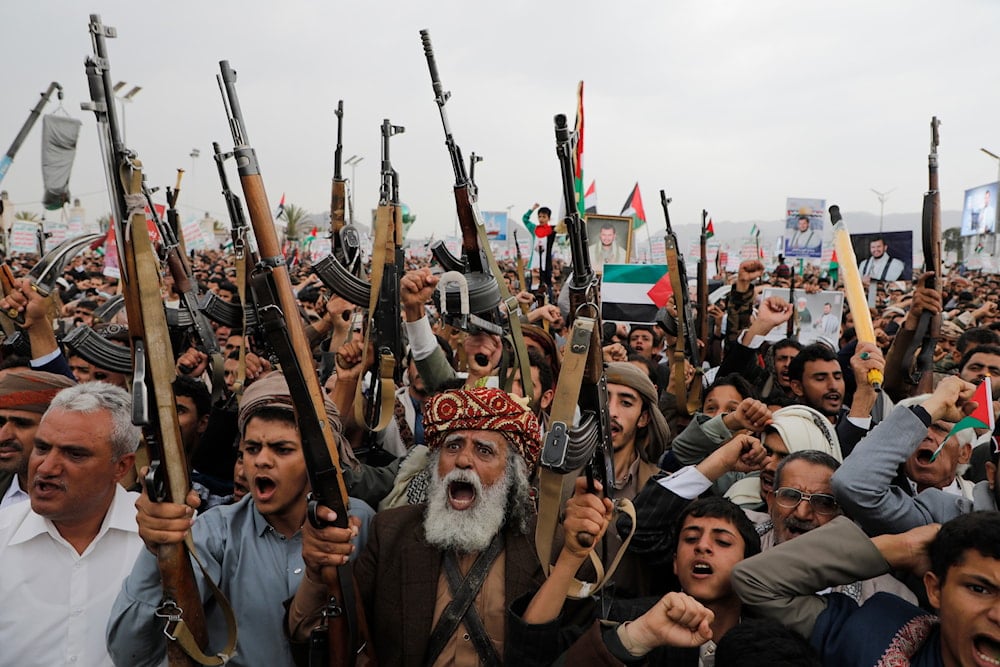Al-Houthi: Resistance position is to respond to Israeli crimes
The Ansar Allah chief emphasized that "Israel" will not achieve any of its goals in breaking the Resistance or extinguishing the spirit and iron will of the people.
-

Yemenis attend a rally against the U.S. and Israel in Sanaa, Yemen, on Friday, July 19, 2024 (AP Photo/Osamah Abdulrahman)
The leader of the Ansar Allah movement, Sayyed Abdul Malik al-Houthi has extended his condolences mourning the martyrs of the resistance axis in Iran, Lebanon, and Iraq to their respective groups.
The Yemeni leader emphasized that no matter the sacrifices, "the inevitable outcome is victory and the demise of the Israeli enemy and its temporary entity."
He also condemned the "crime of targeting the dear brother and great Resistance leader Ismail Haniyeh," affirming that it will serve as "a greater incentive for resilience, steadfastness, and dedication ... in dealing severe blows to the criminal enemy."
The Ansar Allah chief emphasized that "Israel" will not achieve any of its goals "in breaking the Resistance or extinguishing the spirit and iron will of the ... brothers in Palestine and all support fronts."
"The criminal enemy's involvement in targeting the martyr [Haniyeh] has elevated the battle to a wider scope and greater dimensions, the consequences of which will be dire for the enemy, God willing," he said, assuring that "we will spare no effort, with God's permission and in cooperation with our brothers in the Resistance Axis in avenging the martyr and all the martyrs and the injustice suffered by the Palestinian people."
Regarding the martyrdom of Sayyed Fouad Shokor, Sayyed Al-Houthi called it a clear aggression and dangerous escalation, considering it directly linked to Benjamin Netanyahu's visit to the US coinciding with US movements in the region.
Sayyed Abdul Malik al-Houthi said that martyred leader Sayyed Fouad Shokor (Sayyed Mohsen) devoted his life to al-Quds, extending his condolences to his family, the Islamic Resistance in Lebanon and its Secretary-General Sayyed Hassan Nasrallah, in addition to the Lebanese people, the Resistance Axis and the Islamic Nation.
He stressed that the US is a '"partner and deceiver" who preaches the prevention of expanded war while providing support and participating in "Israel's" effort to expand it, stressing that there is "no objection or resistance from the West towards what the Israeli enemy is doing," and that "after everything the Israelis do, the West takes the initiative to prevent a reaction and legitimate defense of oneself, honor, rights, and homelands."
The chief of Ansar Allah explained that major efforts are being made to contain the reaction to the targeting of Haniyeh and the leader Fouad Shokor.
He reiterated that the position of the resistance axis is clear, which is to respond militarily to the serious crimes of "Israel," warning that international institutions should not be relied upon and that the goal of international institutions is to call for restraint following Israeli actions.
If, he warned, a nation responded with a weak and limited response, then this would only encourage "Israel" to commit further crimes, concluding that the Israeli enemy "will not stop its evil and harm against the nation,” stressing that its demise was inevitable.
Why Israeli strikes in Iran, Lebanon will not harm Resistance much
According to Bilal Y. Saab, an Associate Fellow for Chatham House MENA, 'Israel's' aggressions in Iran and Lebanon have little impact on the Palestinian resistance Hamas and the Lebanese resistance Hezbollah.
As resistance factions and the occupation come closer to a regional war, Saab believes it is improbable because neither side fully wants it.
According to him, it can be widely agreed upon that the Israeli assassination of the head of Hamas's political bureau and leader, Ismail Haniyeh, and Hezbollah commander Sayyed Fouad Shokor in Lebanon do nothing but severely postpone peace talks in Palestine and ensures continued confrontations with the resistance.
Saab contends that Haniyeh's martyrdom has little impact on Hamas, seeing as the group's real commander is Yahya Sinwar, who is stationed in Gaza and has been on the frontlines since 2017.
Likewise, Hezbollah has successfully replaced considerably more powerful leaders than Shokor such as Imad Mughniyeh and Mustafa Badreddine and its military capabilities remain intact.
Due to the multi-front Axis of Resistance which encompasses Yemen, Syria, Iraq, Lebanon, and Iran itself, Saab states that Iran has pushed 'Israel' to a new reality: An attack on one front is "considered an attack against all."
Hezbollah, the Yemeni Armed Forces (YAF), and the Iraqi resistance have all contributed to this reality, Saab notes. Since opening a front on the Lebanese southern border in support of Palestine on October 8, the Secretary-General of Hezbollah, Sayyed Hassan Nasrallah has consistently indicated operations would cease only if a ceasefire in Gaza is secured.
The YAF has successfully disrupted trade in the Red Sea and targeted Israeli vessels, increasing the ante recently by hitting Tel Aviv.

 5 Min Read
5 Min Read








